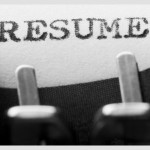The resume is your top tool for creating a quality first-impression for your potential employer. When applying for the job of your dreams, you may find yourself stuck, thinking about what else you can add to your resume to make it all the more impressive. Equally as important as thinking carefully about what to say in your resume, is paying attention to what not to say.
Source: http://worklife.roberthalf.com.au/
Here is a list of 5 things that will work against you landing that dream job:
Irrelevant Job Experience: Keep it short, sweet, and relevant. A resume that follows these rules will be far more valuable to potential employers than those that feature an extensive list containing every piece of work experience that you have had throughout your life. Think about what you have done in your career that specifically relates to the job you are applying for. Make mention of past positions, experience, and skills that most strongly demonstrate the qualifications that your potential employer is seeking.
False Information: It is a rule of thumb that you should never lie, especially on a resume. There are several ramifications you could be facing by placing inaccurate information about yourself on the resume that your potential employer will read. Not only could the discovery of false info drastically ruin your chance of securing your desired position, it may also damage your career prospects in future.
Keep in mind that it is very easy for employers to verify the claims about yourself. They can do so by contacting companies you have worked for. Many such companies will share requested information about their former employees and can highlight the untruths that you propose. Moral of the story here – be 100 per cent honest in what you say, and you will not these problems to worry about.
Salary History: Putting your salary history can severely hamper your negotiating power when it comes to discussing your wages. A case in point, an employer may notice you have previously worked in a similar role for considerably less than what they were prepared to pay. In this scenario, you’ve essentially shown them your hand and it is likely that they won’t offer much more than what you are already earning because they know you are likely to accept.
If you want more information on the wages of similar positions in your industry, consult an online salary guide, such as the Robert Half Salary Guides, so you have a ballpark on how much you should expect your future employer to offer.
Personal information: Remember, it is important to keep everything that you put on your resume as relevant to your dream position as possible. This means there is not really any space left for your personal information to fill up. Apart from your contact details and citizenship status, most other personal details can go. Hobbies can go – unless you have one that is closely related to the position you are going for.
Other attributes such as age, religion, martial status, ethnicity, political affiliation, sexual orientation, and the number of children you have, should also be removed. The reason is that prior knowledge to your personal orientation and affiliations may sway an employer’s decision and open them up for discrimination. It is common for an employer to simply not consider a resume because it has too much personal information and they don’t want to be liable for discriminating against you, even if it was not their intention. Tip: Keep your resume about work only.
Photographs: Likewise, unless you are applying to become a model or an actor, it is not a good idea to put a photograph or a description of your appearance on your resume. Your appearance should not be a factor in your candidacy for an employment position, therefore do not include it.
It is not right for employees to be chosen on this basis and this is recognized by the law. There are legal grounds for employers being accused of discrimination, and many employers simply scrap resumes that have photographs or description of physical attributes.









